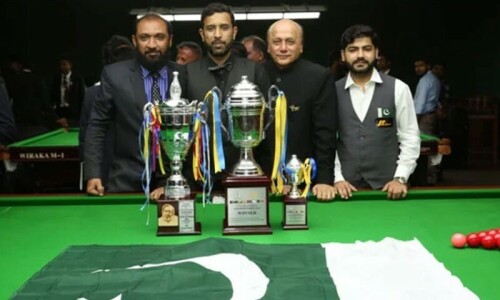
KINSHASA: After two years of delays, crackdowns and political turmoil, the Democratic Republic of Congo voted on Sunday in presidential elections that will determine the future of Africa’s notoriously unstable giant.
The vote gives the DRC the chance of its first peaceful transfer of power since it gained independence from Belgium in 1960.
Analysts, though, say the threat of upheaval is great, given organisational hitches and suspicion of President Joseph Kabila, who refused to quit in 2016 after his two-term limit expired.
The election’s credibility has been strained by repeated delays, fears of chaos on polling day and accusations that electronic voting machines would help to rig the result.
On election eve, talks aimed at averting violence after the vote broke down.
Opposition frontrunners Martin Fayulu and Felix Tshisekedi refused to sign a proposed code of conduct with Kabila’s preferred successor, Emmanuel Ramazani Shadary. They accused officials with the Independent National Election Commission (CENI) of thwarting changes to the text.
Opposition chance?
Many voters said they were exhilarated at taking part in the first elections after the nearly 18-year Kabila era. “I feel liberated, freed,” said Victor Balibwa, a 53-year-old civil servant, casting his ballot in Lubumbashi, the country’s mining capital in the southeast.
But there was also much evidence of organisational problems, including with the contested voting machines.
In some places, long queues built up because of a lack of electoral roll, technical problems or because voters could not find their names on the lists, AFP reporters found.
At Imara in Lubumbashi, 30-year-old voter Diane Mumba, said, “The machines have been breaking down again and again for the last two hours. I don’t know when I am going to vote.”
An election observer in Lubumbashi confirmed, “there are five or six polling stations where the machines aren’t working. You have to wait for a technician”.
In Kinshasa, an elderly lady said she had trouble with the touch-screen voting. “It’s very complicated. I pressed the button without really knowing who I voted for — I didn’t see my candidate’s number or face,” she complained.
In the eastern city of Goma, voters who began queueing before the cut-off of 5pm were allowed to stay on to cast ballots.
Twenty-one candidates are running in the presidential election, taking place alongside legislative and municipal polls.
The frontrunners include Kabila’s champion Shadary, a hard-line former interior minister facing EU sanctions for a crackdown on protesters.
His biggest rivals are Fayulu, until recently a little-known legislator and former oil executive, and Tshisekedi, head of a veteran opposition party, the UDPS.
If the elections are “free and fair”, an opposition candidate will almost certainly win, said Jason Stearns of the Congo Research Group, based at the Center on International Cooperation at New York University.
Opinion polls make Fayulu clear favourite, garnering around 44 per cent of voting intentions, followed by 24 per cent for Tshisekedi and 18 per cent for Shadary, he said.
However, “the potential for violence is extremely high”, he warned. Roughly half of respondents said they would reject the result if Shadary was declared winner, and would distrust DRC courts to settle a dispute fairly.
Frail giant
Insecurity and an ongoing Ebola epidemic in part of North Kivu province, and communal violence in Yumbi, in the southwest, prompted the authorities to postpone the elections there until March.
Around 1.25 million people in a national electoral roll of around 40 million voters are affected.
Despite this, the elections in the rest of the country have gone ahead.
The provisional results will be announced on Jan 6, final results on Jan 15 and the new president sworn in on Jan 18.
Published in Dawn, December 31st, 2018














































Dear visitor, the comments section is undergoing an overhaul and will return soon.